Northern Ireland - Polls and Public Diplomacy
Poll 1 - Peace Building and Public Policy
The first poll was conducted as a piece of pure research that explored various policy options for improving relations between the two communities in Northern Ireland. Topics covered included; housing, education, parades, Irish language, policing and political development. As far as the peace process was concerned the poll demonstrated the validity of the methods, the independence of the research and the value of publication in the popular press. Subsequently the political parties elected to take part in the Stormont Talks all agreed to participate in a similar programme of research to address the problems they had to resolve.
Downloads: Northern Ireland Poll 1, the Questionnaire
and the Full Report: SEPARATION OR SHARING?
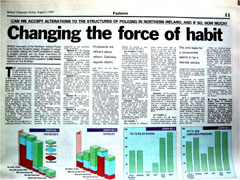
Public Diplomacy
Belfast Telegraph 4 July 1996 Parades
Belfast Telegraph 2 August 1996 Police Reform
Belfast Telegraph 12 September 1996 Settlement
Belfast Telegraph 30 September 1996 Amnesty
Belfast Telegraph 30 October 1996 Schools
Belfast Telegraph 20 November 1996 Employment
Belfast Telegraph 3 December 1996 Settlement
Poll 2 - After the Elections
The second poll was conducted in March and published in April 1997 to help set a context for an invigorated Talks process after the May elections. Some general problems were dealt with as well as procedural questions about decommissioning and the participation of parties with paramilitary associations. In general the electorate wanted 'all party talks' subject to a minimum of preconditions that had to include paramilitary cease-fires. Labour were elected to government in May and subsequently allowed Sinn Féin into the Talks after they called a cease-fire in July.
Downloads: Northern Ireland Poll 2, the Questionnaire and full statistical Report
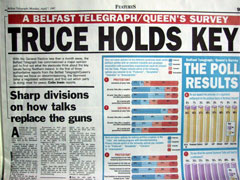
Public Diplomacy
Belfast Telegraph 7 April 1997 Front Page
Belfast Telegraph 7 April 1997 Story
Belfast Telegraph 8 April 1997 Front Page
Belfast Telegraph 8 April 1997 Story
Belfast Telegraph 9 April 1997 Front Page
Belfast Telegraph 9 April 1997 Story
Belfast Telegraph 9 April 1997 Leader
Poll 3 - The Stormont Talks
The Democratic Unionist Party (DUP) and United Kingdom Unionist Party (UKUP) said they would not stay in the Talks with Sinn Féin present and the Ulster Unionist Party (UUP) said they would consult with the 'grass roots' of their party before deciding if they would stay in or not. If the UUP walked away from the Talks the negotiations would have collapsed. The third poll, conducted in September 1997, demonstrated public support for the peace process and for continued Unionist participation. The Ulster Unionists subsequently decided to stay in the Talks but refused to engage in 'face to face' negotiations with Sinn Féin.
Downloads: Northern Ireland Poll 3, the Questionnaire and full statistical Report
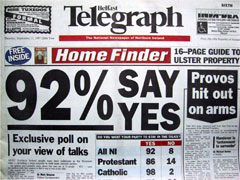
Public Diplomacy
Poll 4 - In Search of a Settlement
While all these political negotiations were going on and the official Talks were stuck on procedural issues all the parties continued to negotiate substantive issues through the public opinion poll process. Thus, in December 1997, a fourth poll was conducted on all the substantive issues and was published in January 1998 in an effort to move the Talks process forward. After increased violence over the Christmas period this effort proved to be successful and most of the parties started to negotiate in earnest with the exception of Sinn Féin which held firm to a 'non-partitionist' settlement that excluded the possibility of a regional assembly for Northern Ireland.
Downloads: Northern Ireland Poll 4, the Questionnaire, full statistical Report
and Full Report with Analysis: THE SEARCH FOR A SETTLEMENT
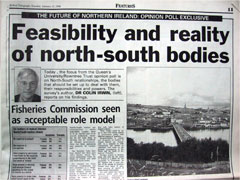
Public Diplomacy
Poll 5 - A Comprehensive Settlement
With the DUP and UKUP outside the Talks and Sinn Féin not willing to actively negotiate, a test 'package' was agreed by the remaining seven parties and a survey conducted in March 1998. The poll also included alternatives put forward by the DUP, UKUP and Sinn Féin. This survey of public opinion proved to be critical as it demonstrated the lack of cross party support for the extreme Unionist and Republican proposals while the center ground settlement agreed to by the seven remaining parties could win support if put to the people of Northern Ireland in a referendum. Subsequently, on 22 May 1998, seventy one percent of the population voted in favour of the Belfast Agreement.
Downloads: Northern Ireland Poll 5, the Questionnaire and full statistical Report
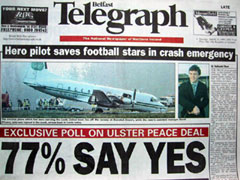
Public Diplomacy
Poll 6 - Implementation of the Belfast Agreement
The details of the new institutions of government were agreed in a vote of the New Northern Ireland Assembly on 16 February 1999 but the Unionists refused to sit in an Executive with Sinn Féin prior to decommissioning. In an effort to overcome these difficulties a poll was conducted in collaboration with the Assembly parties representing the principal paramilitary groups - Sinn Féin and the Progressive Unionist Party (PUP). The results were published on 3 and 4 March. Over 90% of the people of Northern Ireland wanted the peace process to succeed and were willing to have their political representatives reach an accommodation to achieve this outcome.
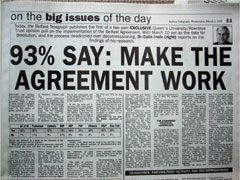
Downloads: Northern Ireland Poll 6, the Questionnaire and full statistical Report
Public Diplomacy
Poll 7 - The Mitchell Review
Unfortunately the negotiations of that summer failed with the Unionists refusing to take up their Ministerial posts in the absence of a hand over of weapons. Faced with a political 'stand off' Senator George Mitchell was persuaded to undertake a review and another poll was conducted in support of these negotiations. It did not produce any remarkably new results but on this occasion all the Pro-Agreement Parties were involved. Critically the Ulster Unionists now took the results of the poll seriously and a 'step by step' programme for implementation was agreed.
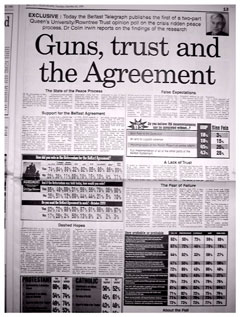
Downloads: Northern Ireland Poll 7, the Questionnaire and full statistical Report
Public Diplomacy
Poll 8 - The Future of the Peace Process
Although the Mitchell Review moved the Northern Ireland peace process forward by creating conditions in which the Executive could be established the hardening of both Ulster Unionist and IRA attitudes towards the question of decommissioning forced a suspension of the Executive in February of 2000. In addition to repeating all the contextual peace process questions asked in the Mitchell Review poll the most recent in this series of polls also tested the two governments' new proposals for decommissioning that entailed 'placing arms beyond use'. The poll demonstrated grass roots Ulster Unionist support for these new proposals and the Ulster Unionist Council subsequently voted to take the party back into government with Sinn Féin.
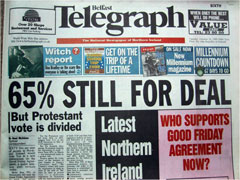
Downloads: Northern Ireland Poll 8, the Questionnaire and full statistical Report
Public Diplomacy
Poll 9 - Devolution and the State of the Northern Ireland Peace Process
The next two years saw periods of relative stability interspersed with moments of crisis, suspension, elections, public opinion polls run by third parties and new deals done. But progress was made, particularly in the area of policing, with the SDLP joining the new Policing Board in September 2001. However, in late 2002 continued IRA activity lead to a crisis of confidence in the Belfast Agreement itself forcing yet another suspension. So a new peace poll was commissioned to explore all the issues that still had to be dealt with or what were then being called 'acts of completion'. The poll demonstrated the frustration of the general public with the failures of their political representatives, their desire for genuine political stability and for the two governments and pro-Agreement parties 'to do what had to be done' to achieve that end.
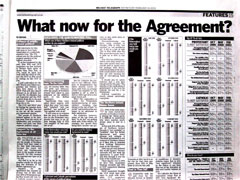
Downloads: Northern Ireland Poll 9, the Questionnaire, full statistical Report and an Analysis
Public Diplomacy
Reviews and comparisons between the peace processes in Northern Ireland, Cyprus, Israel and Palestine and what should be 'International Negotiation Best Practice' all in:
THE GLOBAL REVIEW OF ETHNOPOLITICS Vol. II, no. 3-4, March/June 2003
FORUM: NORTHERN IRELAND By Colin Irwin, Landon E. Hancock, Sid Noel and Caroline Kennedy-Pipe

